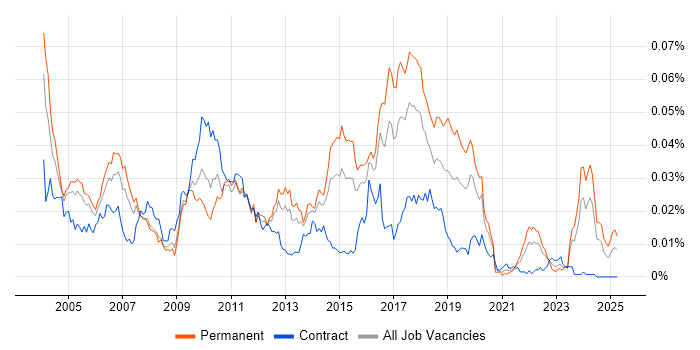Messaging Developer
UK
As of 2 May 2025, there is not enough information available from job vacancies posted within the last 6 months to determine the median Messaging Developer salary in the UK.
| 6 months to 2 May 2025 |
Same period 2024 | Same period 2023 | |
|---|---|---|---|
| Rank | 685 | 855 | 980 |
| Rank change year-on-year | +170 | +125 | +199 |
| Permanent jobs requiring a Messaging Developer | 6 | 47 | 3 |
| As % of all permanent jobs advertised in the UK | 0.012% | 0.048% | 0.003% |
| As % of the Job Titles category | 0.013% | 0.050% | 0.003% |
| Number of salaries quoted | 0 | 47 | 1 |
| 10th Percentile | - | £51,000 | - |
| 25th Percentile | - | £57,500 | £87,500 |
| Median annual salary (50th Percentile) | - | £65,000 | £90,000 |
| Median % change year-on-year | - | -27.78% | +80.00% |
| 75th Percentile | - | £80,000 | £92,500 |
| 90th Percentile | - | £95,000 | - |
| UK excluding London median annual salary | - | £65,000 | - |
All Permanent IT Job Vacancies
UK
For comparison with the information above, the following table provides summary statistics for all permanent IT job vacancies. Most job vacancies include a discernible job title that can be normalized. As such, the figures in the second row provide an indication of the number of permanent jobs in our overall sample.
| Permanent vacancies in the UK with a recognized job title | 46,967 | 93,227 | 95,240 |
| % of permanent jobs with a recognized job title | 90.30% | 94.63% | 91.55% |
| Number of salaries quoted | 27,330 | 66,890 | 59,886 |
| 10th Percentile | £30,000 | £28,500 | £32,500 |
| 25th Percentile | £42,000 | £38,500 | £45,000 |
| Median annual salary (50th Percentile) | £57,500 | £52,900 | £60,000 |
| Median % change year-on-year | +8.70% | -11.83% | - |
| 75th Percentile | £75,000 | £71,250 | £81,250 |
| 90th Percentile | £97,500 | £90,000 | £100,000 |
| UK excluding London median annual salary | £52,000 | £50,000 | £52,500 |
| % change year-on-year | +4.00% | -4.76% | +5.00% |
Messaging Developer
Job Vacancy Trend
Job postings that featured Messaging Developer in the job title as a proportion of all IT jobs advertised.

Messaging Developer
Salary Trend
3-month moving average salary quoted in jobs citing Messaging Developer.
Messaging Developer
Top 2 Job Locations
The table below looks at the demand and provides a guide to the median salaries quoted in IT jobs citing Messaging Developer within the UK over the 6 months to 2 May 2025. The 'Rank Change' column provides an indication of the change in demand within each location based on the same 6 month period last year.
| Location | Rank Change on Same Period Last Year |
Matching Permanent IT Job Ads |
Median Salary Past 6 Months |
Median Salary % Change on Same Period Last Year |
Live Jobs |
|---|---|---|---|---|---|
| England | +130 | 6 | - | - | |
| London | +112 | 6 | - | - |
Messaging Developer Skill Set
Top 15 Co-occurring Skills and Capabilities
For the 6 months to 2 May 2025, Messaging Developer job roles required the following skills and capabilities in order of popularity. The figures indicate the absolute number co-occurrences and as a proportion of all permanent job ads featuring Messaging Developer in the job title.
|
Messaging Developer Skill Set
Co-occurring Skills and Capabilities by Category
The follow tables expand on the table above by listing co-occurrences grouped by category. The same employment type, locality and period is covered with up to 20 co-occurrences shown in each of the following categories:
|
|
||||||||||||||||||||||||||||||||||||||||||||||||
|
|||||||||||||||||||||||||||||||||||||||||||||||||
